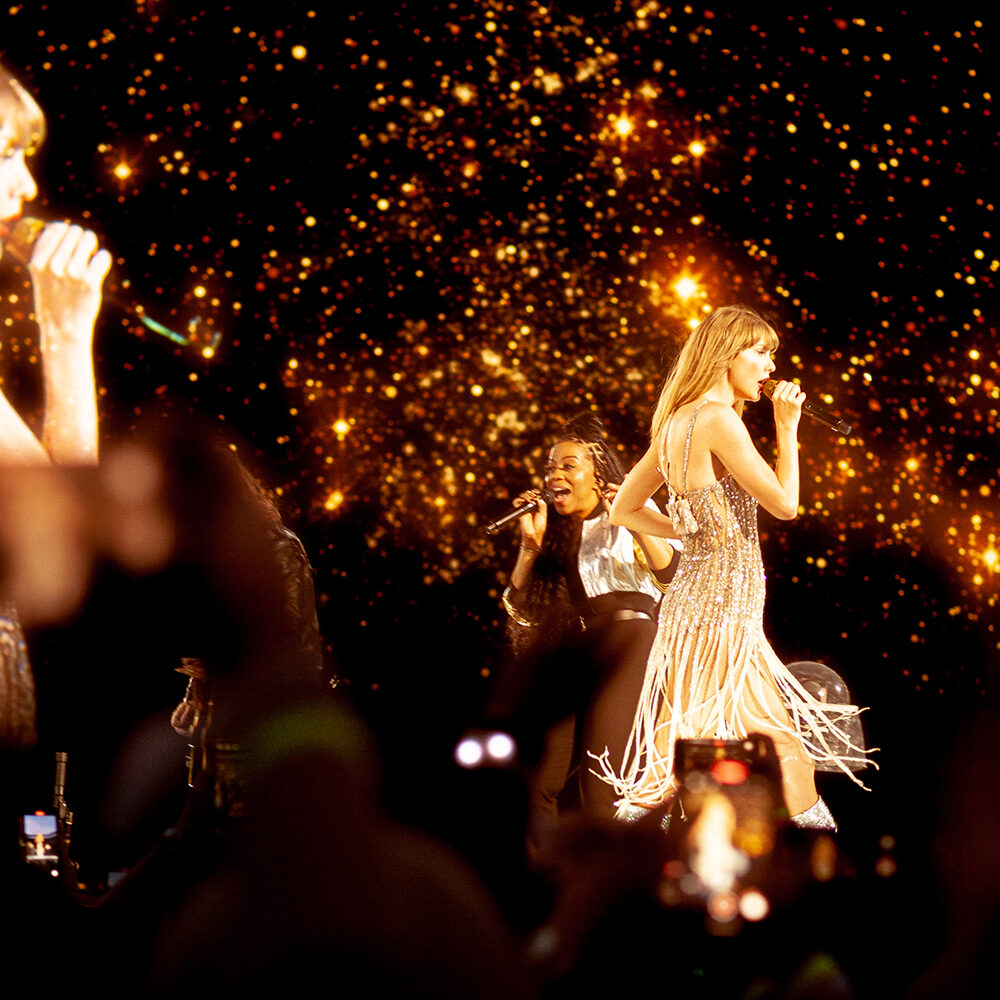Late on a Friday night on the L-train, a couple clung fixedly to a subway pole in the middle of the jolting car, dissecting the nuances of a show that finished just minutes ago at the Music Hall of Williamsburg. Among their descriptions were words like “synesthetic” and “conniving” – “I kept finding myself making the same faces he was making,” she said at one point. They were talking about Noah Gundersen, who is currently on tour supporting his new album, WHITE NOISE.
The record is a shift from Gundersen’s previous work both stylistically and contextually: while his prior acoustic-folk releases grappled with themes of flagrantly vulnerable spiritual ambivalence, WHITE NOISE feels like an exhale. It’s an assembly of songs that are dissonant and guttural, contemplative and anthemic. In a way, they carry a slightly intimidating air: it’s clear that Gundersen has departed from genteel, on-the-nose confessionality and is instead filling into this newfound footing at full force.
The new record isn’t void of Gundersen’s signature searching tone, though. WHITE NOISE’s lurching opening tracks skip over the niceties and plunge unabashedly into the proclamation of revelations and questions.

“’I want everything all the time / But nothing ever satisfies’ is probably one of the truest things I’ve ever written,” he described about AFTER ALL (EVERYTHING ALL THE TIME) on a track-by-track breakdown on Consequence of Sound. There are notes of cultural criticism – “Some days the world feels like a building on fire / But everyone’s ignoring the smoke / You would vote for a comedian / If he could comfort you with a joke,” he sings on DRY YEAR – along with poignant explorations of various themes like desire, anxiety, fear and desolation throughout. There isn’t one coherent narrative or overarching message in this album, but the songs are all tied together with emotional integrity and a palpable sincerity.
“I pivoted more towards abstractions that hopefully could elicit an emotional reaction,” Gundersen said when we spoke earlier that afternoon. We met in the green room of a television studio in New York City in the middle of a busy press day for him (“Content,” he said, with a smirk). He carries a bit of an intimidating air about him, too, tall and leather-clad with tattoos up his hands. But his brooding demeanor quickly faded, and instead of stoicism, he spoke with warmth and graciousness. “I love Radiohead and Thom Yorke is really good at that. You can listen to his songs and have no idea what they’re actually about, but they make you feel a certain way. That’s what I wanted to do,” he explained.
The thing about obscurity is that it is equal parts unnerving and comforting. At first glance (or listen), attempting to pin down an objective meaning seems like a futile effort. But the longer we sit with it, the more we realize that it gives us room to project our own shit onto someone else’s creation. There’s already forgiveness for that act of indulgence because there’s no such thing as “getting it wrong”.
And while our circumstances may not necessarily parallel, coming together to experience art like this leaves us emoting identically, usually in a reverential gaze at truth. It makes sense, then, that those subway riders used those words to describe Noah Gundersen’s performance. Even though his particular act of release is backed by a full band and blazing colored lights, we all still cram in, baggage and all, and lean close. We make the same faces. We feel the same feelings.
“The band and I are trying to take people to a place,” he said. “There’s a mood that gets created that can only happen when you’re in a room full of other people experiencing the same thing.”
Just as Gundersen’s music invites the listener to almost selfishly probe deeper and personalize, I, too, found myself doing the same while we talked, divulging bits of my own connection to his work.
I first discovered Gundersen’s music when I was in high school as a teenager that certainly hadn’t garnered the life experience to relate to the lyricism literally. The songs on his debut record, Ledges, posed questions that I was too scared and too untried to ask at the time.
When Carry the Ghost came out in 2015, I started to get it more. Gundersen’s contemplations equipped me with the will to peruse my own, pushing me to delve into my doubt and apprehension instead of hiding behind apathy disguised as piety.
And what I’ve discovered, at 20 years old (“Right in the thick of it,” according to Gundersen), is that we’re allowed to not know. We’re allowed to get it wrong. That epiphany spurs our unburdening, a process that hardly ever looks like cleanly plotted points on an upward trajectory – a lot of the time, it’s frenetic and turbulent and leaves us in the dark with haunting echoes. Like WHITE NOISE.
“I know that it’s scary. I’m 28 and I still feel like I’m now beginning to understand a few things. But one of the things I feel like I’m understanding is that no one actually knows what they’re doing,” he said, smiling. “Honestly. No one has any idea what they’re doing. Everyone’s just making it up as they go along. But living in fear, fear of judgment from other people, it limits your experience in life and your creative life.”
Being an artist involves both the beautiful and brutal tendency to take on the exasperating task of constantly turning inward. There comes a point in any real maturation when you begin sifting through what’s honest and what’s just regurgitated, and in that effort to eliminate falsity, you might just end up actively raging against it. But what emerges is more true; though it may be unconventional and startlingly different, it can still draw in rooms full of people ready to listen intently.
“You’re always changing. I’m always changing. And if art is an expression of our identity and of our vision of the world, that vision is constantly shifting. It’s important to take stock. Sometimes it takes a minute for the expression to catch up with the observation,” noted Gundersen. “It is a bit of a risk, but at the end of the day, I have to live with myself and I have to live with my art, and even if no one liked it, I’m still proud of it, because I’ve made what I wanted to make.”
I walked away from our conversation feeling surer, deeply affirmed and emboldened. And right away, within a few hours, I felt like I’d completely backtracked as I sat and cried repugnantly (and very publicly) on a park bench. Life immediately presented me with a new set of challenges and conversations that forced me to rethink my purpose, decisions and convictions all over again, building up from what felt like a complete lack of solidity. Back to square one.
But maybe that’s the whole point. Like Gundersen said, we’re always just making it up as we go, moving through life with flailing arms in hopes that they’ll catch hold of something steady. Sometimes that steady thing is the hand of someone else, someone that’s worked through their own mess and bared it to the masses, paving the way for you to understand that there is, in fact, a redemptive side to everything. And if the conclusions we arrive at confidently eventually come unraveled, “then well, shit, I was wrong,” he laughed. Still, there’s always a consolation, and Gundersen asserts it on HEAVY METALS:
Only human after all
Every impulse calls
Automatic animals
Hold your breath
Count to ten
You’ve got a lot to learn yet
Connect with Noah Gundersen: Twitter / Instagram / Facebook
Also, you can find Leah on Twitter or Instagram. Dialogue, fresh ideas, and hot takes are all wanted and welcomed here.









